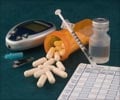There is no correlation between the use of shockwave lithotripsy which is used to break up kidney stones and the long-term development of diabetes.

"We believe this 'clears the air' on this topic, which has been the subject of debate for some time," Dr. Gettman says.
Among more than 5,200 patients analyzed, 14.1 percent were found to have developed incident diabetes, while just 8 percent were treated with shockwave lithotripsy pointing to no significant correlation between the treatment and the incidence of diabetes. Multiple analytical approaches were used, and researchers controlled for age, gender and obesity.
According to the National Kidney Foundation, 5 percent of Americans will develop stones in the kidney, bladder and/or urinary tract. Shockwave lithotripsy, a nonsurgical technique for treating such stones, uses high-energy shock waves to break stones into tiny fragments small enough for patients to pass in their urine.
While shockwave lithotripsy is the most common treatment for kidney stones, it has been known to affect the pancreas in certain patients. Because of the critical role the pancreas plays in the development of diabetes, there has been some concern that the use of shockwave lithotripsy could cause diabetes.
Source-Eurekalert















